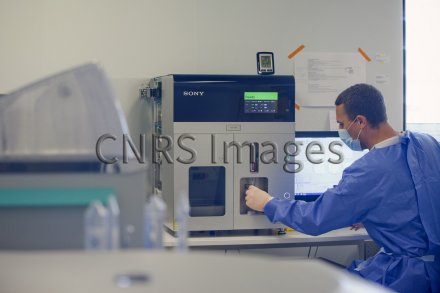Production year
2017

© Christophe HARGOUES / IGH / CNRS Images
20170072_0006
Tubes of cells (healthy and infected) from a blood sample from a patient infected with HIV-1 being placed into the sorter in the P3 laboratory at the Institute of Human Genetics (IGH). These first tubes will be used to adjust and validate the combination of markers selected. The aim is to sort and separate the cells expressing the identified marker (infected cells) from the healthy and infected cells not expressing it. This marker characterises 54% of the total infected cells in the blood on average. It is in this laboratory that this marker has been identified, making it possible to differentiate between dormant or reservoir cells, infected with HIV, and healthy cells. This discovery will make it possible to isolate and analyse these reservoir cells which, by silently hosting the virus, are responsible for its persistence even in patients receiving antiretroviral treatment, whose viral load is undetectable. It offers new therapeutic strategies for targeting infected cells.
The use of media visible on the CNRS Images Platform can be granted on request. Any reproduction or representation is forbidden without prior authorization from CNRS Images (except for resources under Creative Commons license).
No modification of an image may be made without the prior consent of CNRS Images.
No use of an image for advertising purposes or distribution to a third party may be made without the prior agreement of CNRS Images.
For more information, please consult our general conditions
2017
Our work is guided by the way scientists question the world around them and we translate their research into images to help people to understand the world better and to awaken their curiosity and wonderment.